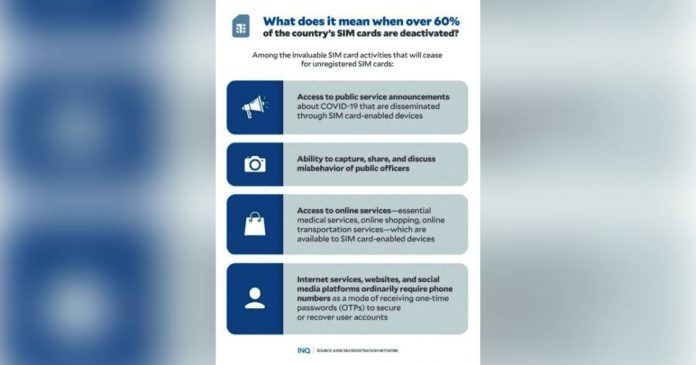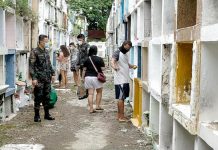
MANILA — As the deadline for the registration of all Subscriber Identity Module (SIM) cards draws near, the biggest question is what happens next to millions of SIM cards that have yet to be registered?
The possibility of these SIM cards being rendered useless loomed as representatives of various sectors filed a petition challenging the constitutionality of the SIM Registration Act, the law that mandated SIM card registration in a bid to stamp out scams using these.
Republic Act No. 11934, or the SIM Registration Act—signed on October 22, 2022, and took effect on December 27 of the same year—required all mobile subscribers to enroll their SIM cards within 180 days or six months from the effectivity of the law or face automatic deactivation of their cards.
SIM card registration aims to reduce, and eventually eliminate, the spread of spam messages, scams, and other criminal activities like “smishing” committed by fraudsters—which increased during the pandemic.
However, data showed that hundreds of millions of SIM cards have yet to be registered days before the deadline.
Aside from the low registration count, which Globe Telecom Inc. had attributed to lack of valid government IDs and digital illiteracy, a 59-page petition has been filed at the Supreme Court last April 17 seeking to declare the SIM registration law unconstitutional and a temporary restraining order to stop its implementation.
The petitioners consist of “representatives of sectors who stand to lose fundamental human rights with the full implementation of SIM registration.”
“We assert the unconstitutionality of the SIM registration law which stands to disenfranchise at least 100 million as-yet-unregistered Filipinos,” said Maded Batara III, petitioner and spokesperson of the Junk SIM Registration Network, in a statement.
“At present, access to communication is directly tied to the freedom of speech, especially as more and more of our lives are migrating to digital space. Requiring registration will heavily restrict this fundamental freedom for many Filipinos who are unable to register due to logistical or privacy concerns,” he added.
SIM cards deactivated, users silenced
An estimated 168,977,733 SIM cards are currently in use in the country which means that at least 100 million SIM cards that are still yet to be registered as of April 16 “will be deactivated and their users permanently silenced” when the deadline comes—according to the petitioners.
The petitioners stressed that deactivating unregistered SIM cards will have many impacts and consequences:
* The dissemination of invaluable public service announcements from the government will reach only a minority of the population;
* Ordinary citizens will not be able to capture, share, and discuss the misbehavior of public servants;
* Unregistered Filipinos will be locked out of essential online services and highways of information—such as digital banking, online shopping, and transportation services;
* Unregistered Filipinos will not be able to use internet services, websites, and social media platforms that require phone numbers as a mode of receiving one-time passwords (OTPs) to secure or recover user accounts.
From ‘good intentions’ to ‘chilling effects’
The petitioners acknowledged that the SIM Registration Act “started because of good intentions.”
“The unambiguous aim of R.A. No. 11934, according to its sponsors, is to deter illegal acts using SMS technology and to aid law enforcers in tracking purported criminals,” the petition stated.
However, they pointed out that the law violated fundamental human rights. The petitioners argued that the law “conditions the exercise of speech through the use of SIM cards by imposing a system of prior restraint through mandatory registration.”
The failure to disclose required information results in enforced silence, “effectively turning every citizen into a suspected criminal.”
The petition claimed that the Sim Registration Act violates the following:
* Freedom of speech and its cognate rights by imposing a system of prior restraint.
* The right against unreasonable searches and seizures and to privacy of communication.
* Substantive due process by intruding into the life, liberty, and property of petitioners.
* Free access to courts by limiting access to justice to only registered devices.
“The SIM Registration Act is itself a scam because it tricks Filipinos into giving up their rights to speak freely and to remain private,” said lawyer Michael Christopher De Castro, one of the lead lawyers and petitioners in the case.
“I have no special reason for filing this petition, I am just doing my duty as a citizen and as an officer of the court,” De Castro added.
Onto a safer digital space
Despite the arguments presented in the petition, President Ferdinand Marcos Jr. announced last month that the number of text complaints received by the NTC had dropped by 93.3 percent following the implementation of the SIM Card Registration Act.
“Our digital space is slowly becoming safer so we urge the public to register their SIM cards to help them in their work, businesses, and lives,” Marcos urged Filipinos.
The update was released months after the NTC and the DICT issued serious warnings against new scams that could victimize Filipinos who intend to register their SIM cards.
In January this year, several scams riding on the registration of SIM cards were discovered. These include fake emails about a pre-registration process, SIM card registration fees, and alleged pre-registered cards sold in the black market.
With hundreds of millions of SIM cards in the country still unregistered, telecommunication companies are asking for an extension of the registration deadline to prevent the deactivation of the millions of SIM cards in circulation.
Latest data from the NTC showed that only 42.58 percent (71,952,802) of the total SIM cards nationwide have been registered as of April 16.
Out of the registered SIM cards, 5,263,475 are registered with Dito Telecommunity, 31,038,672 with Globe Telecom, and 35,660,655 with Smart Communications.
In a statement last April 3, the DICT said the deadline for SIM card registration will not be extended beyond April 26. DICT Undersecretary Anna Mae Lamentillo, the DICT spokesperson, said the public should take the deadline seriously.
In a radio interview last April 17, NTC Deputy Commissioner Jon Paulo Salvahan said regulators and stakeholders are studying the possible extension of the SIM card registration deadline.
“This week we will have series of meetings with the telcos to discuss possible extension. [The NTC] along with the DICT and the telcos are still studying if there’s a need to extend the deadline in April 26,” Salvahan said in Filipino.
Section 4 of the SIM Registration Act stated that the DICT may extend registration for a period not exceeding 120 days. (Cristina Eloisa Baclig, Content Researcher Writer © Philippine Daily Inquirer)







